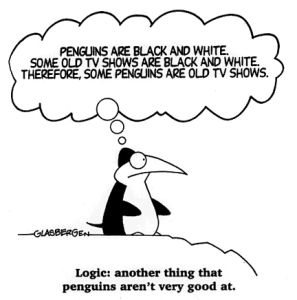
A town hires a new sheriff and in the next three years the theft rate drops twenty-five percent. In appreciation of the reduced theft rate, the city council votes to give him a hefty raise. But are they confusing correlation with causation?
Perhaps the theft rate is down because thieves have been so good at stealing that there’s not much left to steal so they have moved to another town. Or perhaps an aggressive salesman has sold theft deterrent systems to most homeowners. Or perhaps the judge has increased the punishment for theft so it no longer pays to be a thief.
False causality is a mental shortcut—it’s lazy thinking—that can lead to bad decisions. Instead of taking the time and effort to look beyond a simple relationship (new sheriff—lower crime rate) we often just assume they are linked by cause and effect.
Instructional designer Archana Madhavan brings clarity to the difference between correlation and causation. She writes:
“While causation and correlation can exist at the same time, correlation does not imply causation. Causation explicitly applies to cases where action A causes outcome B. On the other hand, correlation is simply a relationship. Action A relates to Action B—but one event doesn’t necessarily cause the other event to happen.
“Correlation and causation are often confused because the human mind likes to find patterns even when they do not exist. We often fabricate these patterns when two variables appear to be so closely associated that one is dependent on the other. That would imply a cause and effect relationship where the dependent event is the result of an independent event.
“However, we cannot simply assume causation even if we see two events happening, seemingly together. One, our observations are purely anecdotal. Two, there are so many other possibilities for an association, including:
-
-
- The opposite is true: B actually causes A.
- The two are correlated, but there’s more to it: A and B are correlated, but they’re actually caused by C.
- There’s another variable involved: A does cause B—as long as D happens.
- There is a chain reaction: A causes E, which leads E to cause B (but you only saw that A causes B from your own eyes).”
-
So don’t jump to conclusions. Don’t make a connection where none exist. Take the time to think through all effects and consider what prompted them.
Must read article
Here’s an interesting and helpful article titled Asking One Simple Question Can Entirely Change How You Feel

Interesting timing, Don. Last night I was presenting a mini-lecture on logic in the course I teach Tuesday evenings. One of the bullets on the Logic review:
The flaw of logical reasoning: the reasoning makes broad generalizations from specific observations. “Harold is a grandfather. Harold is bald. Therefore, all grandfathers are bald.”
Logic and argument are fun topics to study. I just started reading a book titled Why we Argue And How We Should that is very good.
Thanks for our friendship. Don
Always enjoy your posts, very thought provoking. Glad you and the gang are back safely, even somewhat surprised you directed the musicians in church Sunday…you were right, no better place to be on Sunday that SCC..
Thanks, Bill. We had a great trip with 25 friends. I’m just now totally over jet lag, one week later. Take care, Don.
Good insight as usual-we are all guilty of this, and become the owners of false assumptions going awry.
Thanks, Jennifer, for taking the time to respond.
Don